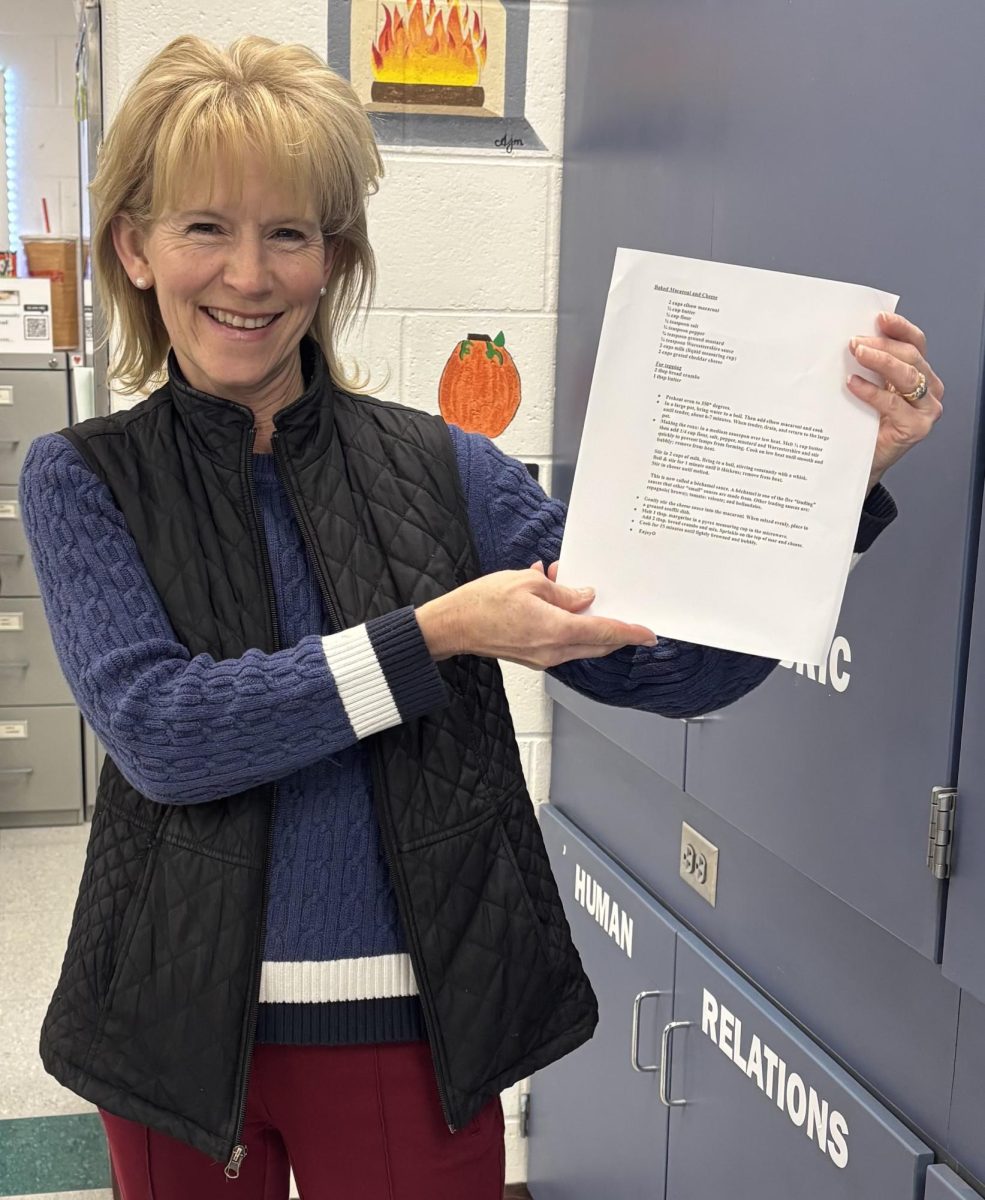Grades are a central part of a student’s educational experience. Through the CavChron’s investigation into Grading Structures & Practices, we hope to shed light on Grading Philosophies, Rapid Grade Access, Midterms & Finals and Class Rank.
It has been 1,084 days since the Hollis Brookline COOP School Board voted to remove the class rank system and move to the Latin Honors System at HBHS. In getting rid of ranking the top ten students, they instead moved to recognize students in three categories based on their GPA: Cum Laude, Magna Cum Laude and Summa Cum Laude. Now, after two classes have graduated without class rank, the CavChron investigates the original purpose of the change, whether it was achieved, and the overall effects on students.
The Original Purpose
In 2021, the Hollis Brookline COOP School Board did not make this decision lightly. At the time, one of the pressing factors of the board’s decision was the hostile and competitive environment that was created within HBHS due to class rank. Chantel Klardie, department head of Guidance at HBHS, referenced how previous students would create spreadsheets and enter their grades to determine whether they would be in the top 10. In an article written for the CavChron in 2021, Abigail Brown ‘21 explained in “Class Rank” how ranking students within the top 10 would sometimes come down to a single assignment within their entire high school career. Sometimes depending on a thousandth decimal point, the ranking created a competitive GPA atmosphere.
Subsequently, Rachel Brown ‘23 detailed for the CavChron how this created a concern among school board members that the competitive environment was stressing out students. “We don’t want students to be out of school due to anxiety of being unprepared for a test or quiz,” said COOP School Board member, Tom Solon, in 2021. Furthermore, the decision was supported by the complexity of the course load that students took to achieve top 10 recognition. “When you look at the pathway on how you get to the top ten it just is not equal,” said Rick Barnes, principal at the time, in the article by A. Brown.
At HBHS, in terms of calculating GPA, AP or honors classes carry more weight (up to a 5.0) in comparison to other classes (up to a 4.33). This means that students in AP or honors classes would receive a GPA boost that was generally necessary to reach the top 10. Klardie explained how students would sometimes take AP classes solely to keep their rank. This was something that school board members became concerned about. They didn’t want students “to fear taking a class that interests them and aligns with their goal simply because it won’t help them get into the top 10,” said Solon in 2021. For all these reasons, on January 21, 2021, the HBHS class rank system was removed.
The Impact
Two years now in hindsight, HBHS can witness the short-term positive and negative consequences of removing class rank. Firstly, a sense of inclusivity has replaced the previous competitively focused setting. The new Latin Honors system can recognize as many students that achieve the proper GPA of 3.8, 4.0, or 4.2. “Versus just recognizing ten students who have achieved in the top ten of their class, the Latin Honor System allows us to be more inclusive to many students who have worked diligently over their four-year high school career,” said Klardie.
While this is true, some students raised concerns about the recognition and use of the Latin Honors System. Students who achieve these Latin Honors are not widely recognized or congratulated by HBHS in the same means that they were previously with class rank. “It just feels like another area where HB is falling a bit short with recognizing academic achievements instead of sports achievements or other things like that,” said Sarah Riseman ‘24.
Students also raised concerns regarding the process of applying to rigorous colleges without class rank. Riseman addressed the importance that being in the top 20 percent plays in specifically receiving merit aid and scholarships.
On a broader scale, Ava Natalino ‘24 brought up the effect it has on applying and getting into college. In submitting her application to Colby College, a school that focuses on class rank, she said, “I was worried that it would impact my application because I don’t have that evidence to show that I’m in the top percent of my class even though my grades are really good.”
Natalino is not alone in this situation. In the College Board’s Annual Survey of Colleges, more than 3,000 colleges were questioned about the percentage of enrolled freshmen that submitted class rank in their application. From 2007 to 2017, the average of students went down 10 points and 14 points for highly selective colleges. Klardie also addressed this concern, saying how “typically, class rank isn’t a huge indicator for someone to get into college.” This is because many colleges reweigh students’ GPAs to create an equitable number based on many different school’s individual GPA scales. This is further supported by the National Association for College Admission Counseling (NACAC) Admission Trends Surveys done from 2007-08 through 2018-19. From 2007 to 2018, the colleges that attributed “considerable importance” to class rank went down from 23% to 9%. Similarly, in an annual U.S. News survey, only 37% of 1,400 ranked colleges reported class rank as “very important” or “important” during student admissions. Although this was a concern for Natalino, it is becoming increasingly less of a concern for not only HBHS students but high schoolers across the nation.
Another important repercussion to look into has been the change in student’s motivation. Considering the lack of recognition of the top 10 students, there is a possibility that students would lack general motivation to choose challenging courses. However, Klardie addressed these concerns, saying, “it’s more intrinsic now, students who want the experience of learning…are still taking AP or honors courses because that is what more competitive colleges want to see for admissions.” Students at HBHS shared similar opinions regarding their personal experiences during high school. Natalino detailed how the lack of class rank minorly impacted her motivation and how “having class rank would motivate [her] to work harder a little bit, but [she’s] still really proud of [her]self, in how [she’s] done so far.”
Students are still taking advanced classes to challenge themselves without the need to be recognized in the top 10. “I believe [advanced classes] will help me get into a better college and provide me with a better comprehension of the subject and therefore I will have a better career,” said Cait Engle ‘25.
Although students still have the motivation to take advanced classes, the lack of class rank has allowed some students to broaden their course load and take classes that interest them. For example, Engle can take part in her CTE program that has no GPA boost, with no worry of it harming her position in class rank. Similarly, Emma DiGennaro ‘25 is able to take Unified Music, an unweighted class that combines students with and without disabilities on a music-focused platform. Being unweighted, it does not provide the same GPA boost honors or AP classes provide. DiGinennaro explained that she “probably would not have taken [Unified Music]” if class rank was still intact “even though it’s a super rewarding and fulfilling class,” because she would have likely taken “another science or another honors class” instead. Even though students are broadening their course load, some still attribute a feeling of stress related to their GPA. When asked about stress related to GPA, Engle reported that she did not have any while DiGennaro said that she has felt stress during certain classes that could hurt her GPA.
The Future
In some ways, the removal of class rank has the positive impacts that the school board originally hoped for. Students can take a wide variety of courses that interest them, without the need to think about their GPA. Furthermore, students are still motivated to challenge themselves without the previous hostile environment. On the other hand, no system is perfect and some negative impacts can be found. To some, the new Latin Honors system does not provide enough recognition, and some students are still attributing stress to their GPA.
HBHS is not alone in this decision. According to the College Board, in a recent report by the National Association for College Admission Counseling, they found that more than half of high schools no longer use student rankings. Class rank is just one example of the ever-changing high school and college admission landscape; the future of HBHS without class rank will likely depend on how this landscape changes. For now, the answer to the question of whether HBHS should have class rank is not a simple yes or no; it is a complicated and mixed one that depends on each individual student.






![Dr. Barry teaches his son Benin karate as part of a class he provides for school-aged children across Brookline. “I happen to have [karate classes] thrown into the mix of what I do here, because it’s something that I have to offer,” he says. “I enjoy it, I can do it, and I can offer it freely.” (Courtesy Brian Barry)](https://cavchronline.com/wp-content/uploads/2025/04/Man-of-Many-Talents-Brian-Barrys-Service-to-Brookline.jpg)

Xavier Lindsey • Apr 15, 2024 at 1:22 PM
Great article Mason! I love how you spatially organized your research into the past, present, and future! Keep up the great work!